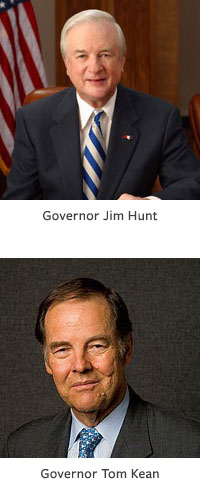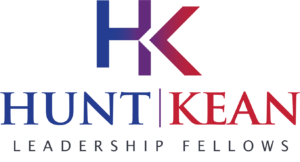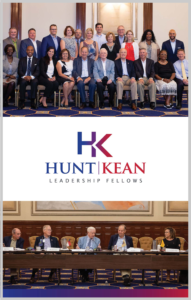The nonpartisan Fellows program:
- Exposes Fellows to the most up-to-date research and analysis on innovative and successful education policies and practices
- Provides an environment that welcomes distinct views in order to foster debate on multifaceted education issues
- Introduces Fellows to other leaders directing successful reform efforts across the nation
By investing in America’s political leaders, we are building informed and motivated educational change agents with the necessary influence to reform state education systems and improve outcomes.
 Both Democrat Jim Hunt and Republican Tom Kean are uniquely qualified for the title “Education Governor.” As the state’s only four-term governor, Governor Hunt led North Carolina through an unprecedented period of educational improvement and economic growth. With a particular focus on early childhood development and improving the quality of teaching in America, Governor Hunt is ranked with U.S. presidents and secretaries of education as one of the 10 most influential people in American education.
Both Democrat Jim Hunt and Republican Tom Kean are uniquely qualified for the title “Education Governor.” As the state’s only four-term governor, Governor Hunt led North Carolina through an unprecedented period of educational improvement and economic growth. With a particular focus on early childhood development and improving the quality of teaching in America, Governor Hunt is ranked with U.S. presidents and secretaries of education as one of the 10 most influential people in American education.
As a former teacher, education policy was of special importance to Governor Tom Kean, who propelled change in New Jersey following the report, A Nation at Risk. Governor Kean proposed, among other things, raising beginning teacher salaries, instituting statewide high school graduation tests, and adopting new approaches to education in urban schools. He, too, has been rated among America’s most effective state leaders.
Whether blazing audacious trails in early childhood education, establishing national teacher certification, connecting education and economic development, making historic NAEP gains, or fighting to raise teacher salaries, these governors understood the essential components of a coherent education policy agenda, how to establish and articulate a long-term vision, and how to use the bully pulpit to inform and move public policy. Governors Hunt and Kean define what it takes to become gubernatorial legend.
The Fellowship includes two in-person sessions – six days total – where Fellows engage with leading minds in education, policy, and politics. Throughout the program, Fellows interact with outstanding educators and school leaders, as well as participate in an intensive site visit of an area school. The curriculum is designed to equip participants with the knowledge, relationships, and inspiration they need to engage in critical conversations about equity and lead on education in their current roles and as they pursue higher office. Fellows, educators, and experts engage in critical dialogue about key education issues such as prenatal to three years, early childhood, teacher policies, school leadership, school choice, standards and assessments, school accountability, postsecondary education, and the workforce.
Fellows are afforded a wide range of learning experiences, including:
- Policy Discussions featuring experts who probe Fellows’ thoughts on the challenges and policy implications of the topics at hand and provide additional knowledge building as needed.
- Study Groups allowing Fellows to gain a deeper understanding about an issue. Fellows break into small groups to engage in a facilitated in-depth discussion, case study analysis, or examination of model policy. They also participate in a deep-dive session where they have the time to present a current education issue that is important to them, share their position on the issue, and receive constructive feedback.
- Strategy Breakouts featuring former governors, which allows Fellows to consider political and strategy implications in an intimate setting.
- Site Visits and Classroom Perspective which provide Fellows a chance to see various issues firsthand and hear points of view from current practitioners. Fellows are equipped with the tools they need to conduct future site visits in their home states.
- A Personalized, In-State Session guided by Hunt Institute staff. Fellows delve into specific policy areas in a private setting, which allows time for individual consultation.
- Monthly Webinars which provide Fellows a venue to discuss timely education policy activities.
- Regional Site Visits where Fellows from across multiple Cohorts participate in small groups to see innovative models in action.




